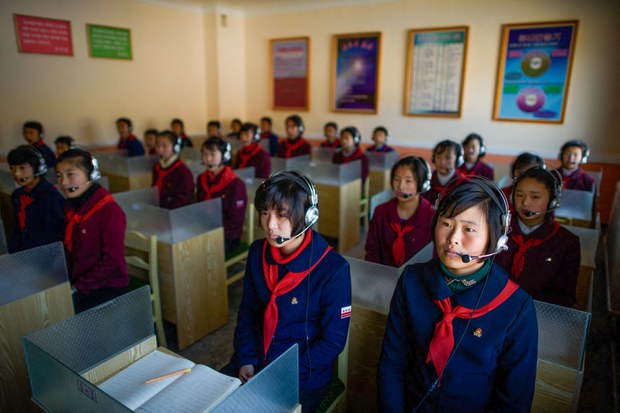Sticky rice cake stuck to North Korean colleges sparks crackdown on superstition
Share

North Korean high school students, shown in this file photo, invoke superstitions – such as sticking rice cakes around universities – during the college exam process in the hopes of getting higher scores.
In North Korea, it’s college entrance exam season, and aspiring students are sticking chalttok, or sticky rice cakes, on signs and walls of universities in hopes that they will be admitted – or “attached or stuck” in Korean – after taking the grueling tests.
But authorities are upset about the superstition, especially after finding a glob of sticky rice cake stuck to the word “great” on a large patriotic billboard on Sinuiju University of Education campus declaring, “Long live the great revolutionary idea,” a resident from the northwestern province of North Pyongan told Radio Free Asia on condition of anonymity to speak freely.
Sticky rice cakes were also found pasted to the walls and fences around the University of Mining and Metallurgical Engineering and the University of Education No. 1 in the northeastern port city of Chongjin, another source there said.
The incidents have sparked a nationwide anti-superstition campaign, they said.
“This issue was reported to the Central Committee and they issued countermeasures,” the first source said.
Defacing a party slogan banner sign could be seen as an unpatriotic act, so penalties could be severe. An investigation was started into the incoming freshman class, the source said.
Regional phenomenon
Similar superstitions involving lucky sounding foods or objects are found elsewhere in Asia, too.
In Japan, Kit-Kat chocolate has come to be associated with good luck because in Japanese it sounds like “Kitto katsu,” which means “I will definitely win.”
In China, college entrance exam superstitions are somewhat of an industry, with new superstitious objects debuting each year. Items like “sunflowers,” “sticky rice wraps,” and even “purple underwear” have been featured in exam-related superstitions because when said in Chinese, they sound like all or part of phrases related to success or good fortune.
But in North Korea, authorities want to do away with the trend.
“A nationwide survey of college freshmen revealed that they engaged in around 50 types of superstitious behavior,” the first source said. “The Central Committee considered it a grave matter and started organizing ideological training against superstitions.”
In addition to the sticky rice cakes, students have been eating or sticking yot, a traditional confectionery, on school buildings, he said.
Fortune tellers targeted
The North Pyongan source said that authorities’ efforts against superstition have included campaigns against fortune tellers.
“In early January, there was the problem that so many residents were getting their fortunes read for the New Year,” he said. “The Ministry of Social Security therefore ordered police in each province, city, and county to crack down on superstitious behavior.”
The source said that in the city of Sinuiju alone, police went house to house and arrested more than a dozen fortune tellers.
“They were sentenced to three months in disciplinary labor centers,” he said. “Five of the fortune tellers were sentenced to one year of hard labor at a correctional labor camp.
“After the crackdown, fortune tellers offering their services in Sinuiju were few and far between, but many college entrance exam candidates visited fortune tellers ahead of the exam,” he said. “So authorities are investigating freshmen.”
Translated by Claire Shinyoung Oh Lee. Written in English by Eugene Whong. Edited by Malcolm Foster.







